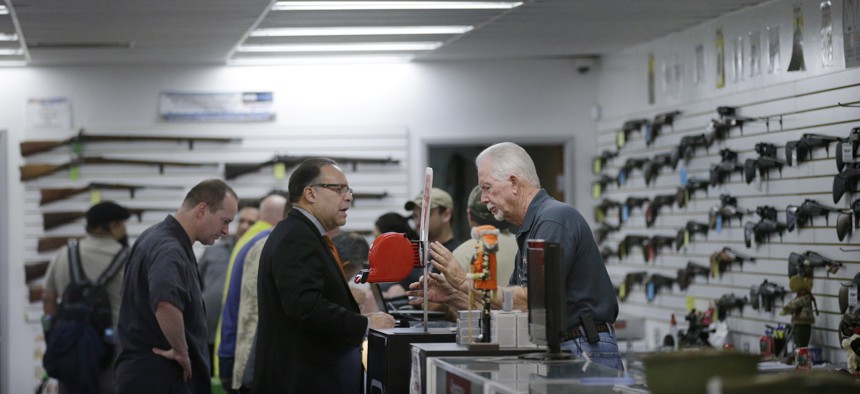State Ban on ‘High Capacity’ Gun Magazines Violates 2nd Amendment, 9th Circuit Rules

A gun shop in Riverside, California in 2015. AP Photo/Jae C. Hong, File
The California law, tied up in court since it was approved by voters in 2016, would ban the possession of firearms magazines that can hold more than 10 rounds.
California’s attempt to ban firearms magazines that hold more than 10 rounds of ammunition violates the Second Amendment, a federal appeals court ruled on Friday.
A panel of the U.S. 9th Circuit Court of Appeals in a 2-1 ruling upheld a lower court decision that found the restrictions unconstitutional. Gun rights advocates hailed Friday’s ruling as an important victory. The majority opinion in the case was written by a judge appointed by President Trump.
“California’s near-categorical ban of [large capacity magazines] strikes at the core of the Second Amendment—the right to armed self-defense,” Judge Kenneth Lee wrote.
Lee said that while California has latitude to enact laws intended to curb gun violence, the state overstepped with the magazine restrictions. “California’s almost-blanket ban on LCMs goes too far in substantially burdening the people’s right to self-defense,” he wrote.
The ruling comes after the U.S. Supreme Court in June declined to hear ten Second Amendment cases, including at least two that raised questions about restrictions on firearms magazines.
In July, the Colorado Supreme Court upheld a regulation there prohibiting the possession of magazines holding more than 15 rounds and acquired after July 1, 2013.
Gun control advocates, such as the Giffords Law Center to Prevent Gun Violence, contend that large capacity magazines have commonly been used in some of the nation’s deadliest mass shootings, enabling shooters to kill more people quickly, without reloading their weapons.
Apart from California, eight states and the District of Columbia have enacted laws to ban magazines that hold over 10 or 15 rounds, according to the Giffords Law Center, including Colorado, Connecticut, Hawaii, Maryland, Massachusetts, New Jersey, New York and Vermont.
At issue in the California case was part of the state’s penal code meant to largely outlaw magazines that can hold more than 10 rounds beginning on July 1, 2017.
This provision was adopted under Proposition 63, a state ballot measure that about 63% of voters backed in 2016. Proposition 63 strengthened magazine prohibitions included in legislation that state lawmakers had approved earlier in the year.
These amendments to the state's gun laws called for citizens with prohibited magazines to remove them from the state, sell them to a firearms dealer, or surrender them to law enforcement.
(Another part of the state penal code did give gun owners an option to keep larger-sized magazines if they were permanently modified to hold no more than 10 rounds. The code also included some narrow exceptions to the magazine ban, mostly for law enforcement agencies.)
California, dating back to 2000, had policies barring people from acquiring larger-sized magazines, but there were carveouts for gun owners who had the magazines before then. The 2016 changes to law would have applied to most of these previously exempt individuals.
People who said they were interested in owning the prohibited magazines and the California Rifle & Pistol Association sued the state over the expanded restrictions in 2017.
Two days before they were set to take effect, a federal district court judge issued an injunction delaying the state from enforcing the tightened rules. The judge later granted the plaintiff’s motion for summary judgment in the case, declaring California’s law unconstitutional and blocking the state from enforcing it.
Friday’s appeals court decision upholds that ruling.
California’s Attorney General’s Office did not respond on Friday to a request for comment about the case.
The National Rifle Association touted the ruling as a “huge win,” said it would have “repercussions nationwide,” and specifically noted that Lee is a “Trump-appointed judge.”
In his opinion, Lee cites an estimate indicating that between 1990 and 2015 about 115 million of the 230 million magazines in circulation among civilians would’ve violated California’s law and said such magazines were allowed in 41 other states and under federal law.
“Half of all magazines in America hold more than ten rounds,” he wrote.
The magazines are not the sort of “unusual” firearm equipment that would not be afforded Second Amendment protections under a 2008, precedent-setting U.S. Supreme Court decision, District of Columbia v. Heller, the opinion also concluded.
Other reasons why the policy fails to pass constitutional muster, according to the ruling, are that the statewide blanket ban on the magazines is not the “least restrictive” means of achieving the state’s public safety goals and it offers no meaningful exceptions for law-abiding citizens.
Lee emphasized that the ruling does not address issues that are not central to the case at hand, such as bans on “assault weapons,” or prohibitions on magazines that hold far more rounds.
Judge Consuelo Callahan, who was appointed by President George W. Bush, joined Lee in the majority.
Dissenting was Judge Barbara Lynn, appointed by President Bill Clinton, who said she would have concluded that the California magazine ban did not violate the Second Amendment.
She said that Lee and Callahan, in ruling the way they did, were at odds with past precedent set by the 9th Circuit and with decisions by other federal circuit courts addressing similar issues.
“Six of our sister Circuits have held that various LCM restrictions are constitutional,” Lynn noted.
Bill Lucia is a senior reporter for Route Fifty and is based in Olympia, Washington.
NEXT STORY: There Are Nine Finalists—and No Mosquitoes—for Mississippi's New State Flag






